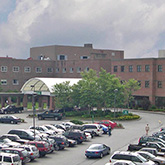At Central Vermont Medical Center our fully accredited Laboratory performs a variety of tests on blood, urine and other body fluids in a professional and caring manner.
The CVMC Laboratory is where tests on blood, urine or other body fluids, ordered by your doctor, are performed. The CVMC lab is fully accredited by the College of American Pathologist to perform these tests and our staff is highly qualified to provide these services in a professional and caring manner.
Patient Information and Instructions
Learn what to expect and how to prepare when your provider has ordered you to undergo the following tests:
It is important that you follow these instructions in order to help insure the accuracy of test results.
Laboratory Tests
The following lab tests are conducted at the CVMC Laboratory (Note: These lab tests can only be ordered by a doctor):
- A1c: The hemoglobin A1c or glycohemoglobin test is used in diabetes management. It measures the average blood sugar level over the last 2 to 3 months.
- Anemia Panel: Vitamin B12 and folate are ordered to diagnosis anemia as well as monitoring the nutritional status of a patient.
- Autoimmune Disease Testing: ANA (anti nuclear antibody) can pick up diseases such as LUPUS.
- BMP (Basic Metabolic Panel): A BMP includes glucose, BUN, creatinine, calcium and electrolytes. It tests for blood sugar, fluid and electrolyte balance, and kidney function. For more information, please refer to each test individually.
- Blood Bank Testing: This includes a patient’s blood type as well as a screen for unexpected antibodies that can occur from pregnancy or blood transfusions. These antibodies are critical when cross matching blood for a patient to be transfused with blood products.
- BUN (Blood Urea Nitrogen): This test measures the amount of nitrogen present in the blood from the waste product urea. It is performed to see how well your kidneys are working.
- Calcium: A calcium blood test checks for the amount of calcium in the body that is not stored in the bones. Calcium is needed to build and repair teeth and bones, aid in muscle and nerve function, and in blood clot formation. This test is used to check for bone problems, pancreatitis, kidney stones, and problems with the parathyroid glands or kidneys.
- Cardiac Blood Tests: Troponin I, BNP, Lipid panel are tests available at CVMC that monitor cardiac health. Troponin I is elevated in a myocardial infarct (heart attack), BNP is elevated in congestive heart failure and lipid panels test for blood lipids such as cholesterol, triglyceride, HDL, and LDL. Control of blood lipids contributes to heart health.
- CBC (Complete Blood Count): The CBC gives important information about the types and numbers of cells present in the blood, such as red blood cells, white blood cells, and platelets. Your provider may order this test as part of a routine screening as well as to diagnose conditions such as anemia and infection.
- COMP (Comprehensive Metabolic Panel): A COMP measures the same tests as the BMP, but also includes some liver function tests. Your doctor may order a CMP as part of a routine screening or to monitor a medical condition, such as high blood pressure.
- Creatinine: This test measures the level of the waste product creatinine in your blood. It is performed to see how well your kidneys are working.
- CRP (C-reactive protein): This test measures the amount of C-reactive protein in the blood. It is a test for general inflammation. High levels of CRP can be caused by infections and many long-term diseases, but a CRP test does not show where the inflammation is located or what is causing it.
- Cytology: The review of cells microscopically to identify disease, infection or cancer is performed in the Pathology Lab.
- Diabetes Testing: Glucose, Hemoglobin A1c, and urine microalbumin are tests available at CVMC that are used to diagnose and monitor diabetes control.
- Electrolytes: An electrolyte panel measures the levels of sodium, potassium, chloride and carbon dioxide in the blood. Electrolytes are minerals found in the body that keep your body’s pH and fluids in balance. They also help in maintaining heart rhythm, muscle contraction and brain function.
- Glucose: This test measures the amount of glucose in your blood. Glucose comes from carbohydrate foods and is the main source of energy used by the body. Normally, your blood glucose level will increase slightly after a meal, but should not vary widely throughout the day; if it does, it could indicate a problem. This test is used in the diagnosis and treatment of diabetes and gestational diabetes, and to check for hypoglycemia. Your doctor may ask you to fast for this test.
- Oral glucose tolerance test (GTT): The GTT is the most widely used test to diagnose Diabetes Mellitus. It is a lengthier test, usually performed to confirm the results of a prior screening test, such as a one hour PC. It looks at the way your body processes blood sugar or glucose. Your doctor may order a two or three hour glucose tolerance test, depending on your symptoms or history. For more information about this test, click here.
- Infertility Testing: FSH, LH , Prolactin, Testosterone and BHCG are hormones that we can use to diagnosis infertility.
- Lipid Panel: A lipid panel measures lipids (fats) and fatty substances used as a source of energy by the body. Lipids include total cholesterol, triglycerides, your “good cholesterol” or HDL (high-density lipoprotein), and your “bad” cholesterol or LDL (low-density lipoprotein). High cholesterol, may lead to coronary artery disease, heart attack, or stroke. Fasting is recommended.
- Liver Panel: A liver panel or liver function tests (LFT) checks to see how well the liver is working. This panel includes tests for albumin, total protein, total and direct bilirubin, alkaline phosphatase (ALP), aspartate aminotransferase (AST), and alanine aminotransferase (ALT). High or low levels may indicate the presence of liver disease or damage. This test may also be done if you have been exposed to hepatitis virus or if you are taking medication known to cause liver damage.
- Magnesium (MG): Magnesium is an important electrolyte needed for proper muscle, nerve, and enzyme function. It also helps the body make and use energy, and is needed to move other electrolytes into and out of cells. Your physician may order this test to find a cause for nerve and muscle problems, low blood pressure, heart problems, and difficulty breathing.
- Microalbumin: A microalbumin test is done to check for the protein albumin in the urine. With normal kidney function, albumin is usually not present in urine. When the kidneys are damaged, small amounts of albumin leak into the urine, causing a condition called microalbuminuria. This test is most commonly used to monitor patients with diabetes and high blood pressure to screen for early kidney disease.
- Pap Smear: CVMC performs the Thinprep Pap Test, a cytology test used to screen women for cervical cancer.
- PT/INR: The prothrombin time (PT) measures how long it takes for blood to clot. The test is used to check for bleeding problems and to monitor anticoagulant therapy. The INR (international normalized ratio) is reported as a means to standardize PT test results, regardless of the testing method.
- Therapeutic Drug Monitoring: Phenobarb, Dilantin, Theophylline, Digoxin, Lithium, Carbamazepine, alcohol, acetaminophen, salicylate are examples of drugs measured at specific intervals to maintain a constant concentration in the bloodstream. The testing can also determine if the concentration is high enough to cause toxicity.
- Thyroid Disease Testing: Your physician may order a TSH (Thyroid Stimulating Hormone), as well as FT4 and T3, to screen for and diagnose problems with the thyroid gland. It is also used to monitor patients being treated for hyperthyroidism and hypothyroidism.
- Urinalysis: Urinalysis checks different components of urine, a waste product made by the kidneys. Your provider may order this test as part of a routine screening or to check for disease or infection of the urinary tract. It can also be used to monitor the treatment of diabetes, kidney stones, high blood pressure, and some liver or kidney diseases. For information about our 24 Hour Urine testing, click here.
- Vitamin D: Vitamin D plays several key roles in the body, but most importantly it helps your body absorb calcium and phosphorus from the food you eat. Vitamin D deficiency may cause hormone problems, as well as muscle pain and weakness.
(Reference: www.webmd.com)
- Pathologist
- Pathologist
- Pathologist
- Pathologist
For more detailed information about any of our services:
- Consult with your primary care provider.
- Check online at the following websites:

CVMC Laboratory
Please check in at Registration in the Hospital's main lobby
Phone
Fax
802-371-5348
Hours
Monday:Please check in at registration in the hospital's main lobby.






